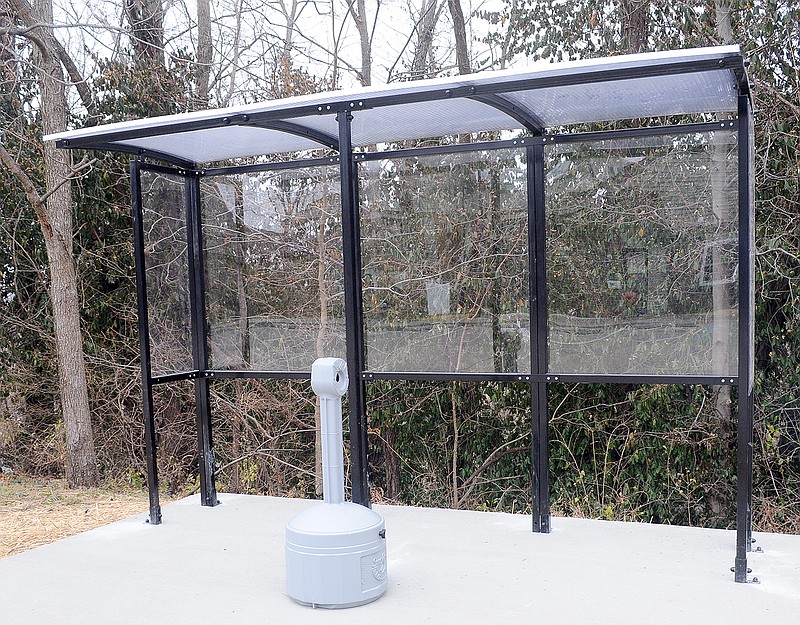Starting next month, all Jefferson City Housing Authority properties will be smoke-free.
Residents will not be allowed to smoke inside units or buildings owned by the Housing Authority starting Jan. 1.
Items included in the policy are cigarettes, cigars, pipes, water pipes, e-cigarettes and vape pens.
Residents will be allowed to smoke in designated areas outside the buildings. Housing Authority Executive Director Cynthia Quetsch said residents who live in properties without designated areas can smoke if they are 25 feet away from the buildings.
The Housing Authority will set up smoking shelters outside all properties except for neighborhoods and Capital City Apartments since there is not a centralized location.
Quetsch said not all of the shelters will be installed by Jan. 1, but there will be designated smoking areas by that time. Each property will have one shelter and multiple designated areas.
In December 2016, the U.S. Department of Housing and Urban Development announced it would implement smoke-free policies for all housing authorities by July 30.
Quetsch said there are health benefits associated with smoke-free apartments because there is a lack of secondhand smoke. It also would save the Housing Authority money on maintenance and turn-around costs. After residents move out, the Housing Authority hires a crew to clean the apartments and prepare them for the next tenants.
"If it wasn't a smoker, then it's a pretty easy job of washing, drying, doing some painting; but if it had been a smoker, it's a lot more involved," she said. "You have to get that nicotine smell out of the place and get the nicotine stains off the walls, which could sometimes require two or three times painting the apartment before the nicotine stops bleeding through, depending on how long someone had lived there and how much they smoked."
Quetsch said she does not know how much money the Housing Authority will save by implementing the smoke-free policy, but other housing authorities have saved 10-30 percent on turn-around costs.
According to HUD, the estimated annual savings for smoke-free public housing is approximately $154 million nationally.
The Housing Authority plans to implement a three-strike rule for violators. The first offense will involve a written notice of the violation. The second will be another written notice with a warning the resident's lease will be terminated if it happens again. The third violation will be a written notice of a lease termination, in which the resident will have 30 days to vacate the unit.
Violation notices will expire after a year if there are no subsequent notices.
Residents will be responsible for informing visitors of the policy, Quetsch said.
Tenants will be charged for damages caused by smoking outside the designated areas.
Quetsch said the Housing Authority received mixed responses from residents regarding the change - non-smokers are excited, while smokers thought it was a form of discrimination.
HUD notes smoke-free policies are legal, and smokers are not considered a protected class.
Quetsch said the Housing Authority will host sessions approved by the American Lung Association and Freedom from Smoking for residents who want to quit smoking. There will be eight sessions Jan. 10-Feb. 21 at Hyder Apartments.
Capitol Avenue improvements
Three commissioners have been named to evaluate 101 and 105 Jackson St., owned by Barbara Buescher, and 103 Jackson St., owned by Stephen Cheryl Bratten.
Last week, Dave Nunn, Bill Gratz and Ken Otke were appointed as commissioners, and the court sent out the commissioners' instructions Tuesday.
The Housing Authority filed a civil suit in August to condemn the three properties as part of the East Capitol Avenue urban renewal plan.
Earlier this month, Cole County Judge Dan Green ruled Buescher had been given adequate notice of a summons and proceeded with the hearing.
The Housing Authority wants to acquire the properties so they can be privately purchased and rehabilitated. The Housing Authority offered to purchase the properties, but Buescher refused and the Brattens did not respond to the offer.
According to the instructions, if an entity is interested in acquiring a property for a public purpose, the property owners must be compensated for the value of the property. If the two can't reach an agreement and a civil suit is filed, the Cole County Court can appoint three commissioners to review the property.
To acquire a property entirely, the entity must offer the fair market value, according to the commissioners' instructions.

